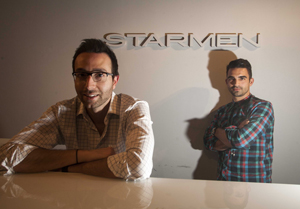
Armen David was working at his father’s Sun Valley shoe manufacturing business when he hired his friend Anthony Wiktor to help design the company’s brochures and fliers.
David quickly decided the two should branch out and start their own marketing firm, Starmen Design Group Inc. in Hollywood. They sold their services to family and friends – even door to door – mostly designing business cards and direct mail.
Then one day, only three months in, they got a call from Malcolm Glazer, owner of the Tampa Bay Buccaneers. He found them on a Google search and hired them to design a brochure promoting luxury suites at the home stadium.
Suddenly, Starmen was a real business.
“I was like, ‘Really? The Tampa Bay Buccaneers are calling us? Do they even know who we are?’ ” Wiktor said. “Keep in mind we were like 24 and 25 years old. … We were young kids.”
That was in 2006. Today, the firm has grown to a staff of six and often hires from a team of 16 freelancers. Annual revenue is almost $1 million. Starmen increased the size of its office space on the Hollywood Walk of Fame in a four-story building from 750 square feet to 2,000.
The firm has worked on projects for DirecTV, HBO Inc. and Hampton Inn & Suites. Clients include pen company Adonit in Austin, Texas, and Discover Your Path Foundation, a charity run by Los Angeles Dodgers pitcher J.P. Howell and his wife, Heather Hennessy. Starmen signed a new client last week, a social lifestyle app.
But the novices had to learn some fine points of the business along the way. And the learning continues: Six months ago they walked into a pitch unprepared.
A major clothing brand wanted to launch a creative campaign to promote a new celebrity-endorsed fashion line. The brand wanted to get its merchandise into high-end retailers such as Nordstrom Inc.
Starmen was competing against three other larger agencies and Wiktor and David presented three different creative campaigns aimed at consumers.
When the people at the brand asked how they planned to get the product into retail locations, they had no response. They hadn’t prepared a strategy to appeal to retailers.
“We just didn’t consider it or didn’t think of it,” David said. “We gave them three different concepts and they were well received but they just saw us as a creative agency, not one that could speak business, marketing and creative.”
So now, instead of helping potential clients create a website and charging them a fixed rate, the firm works on clients’ long-term goals for a monthly retainer.
“After that experience, I started to refuse project business,” David said. “It has helped us be seen as an agency versus a design shop or production house.”
Uncertain debut
David put in $15,000 of his savings to launch the company. He kept his day job at his dad’s business, Reflection Shoes, at the beginning.
“Starmen was something that I started on the side,” he said. “For about a year, I juggled both Starmen and the family business … because I wasn’t sure where Starmen was going to go or what it was going to become.”
His original plan was to create a marketing department at Reflection. But when he started working with Wiktor, he realized they could market other brands, too.
“I felt limited,” David said. “It really appealed to me to have this entity called Starmen that can strictly focus on getting brands to that next level.”
Glazer of the Buccaneers called because Starmen popped up first when he did a Google search. Wiktor said they were paying Google Inc. $100 a month for prime position in search results. Also, Glazer liked the design of their website.
Even then, Starmen was a graphic design firm in its first few years, strictly selling services instead of developing repeat business. Wiktor kept his day job at the L.A. office of Sotheby’s International Realty until 2007.
“It’s not like we were making tons of money,” Wiktor said. “At one point, I was going door to door selling our services, and I thought, ‘You know what? This is not really what I want to do.’ ”
David said that the firm’s challenge is now to scale up.
Jerry McGee, at the L.A. office of New York-based American Association of Advertising Agencies, said that’s the biggest challenge for any small agency.
“That’s the dream that all agencies have is being hired on a partnership basis for a more involved relationship that isn’t an endless sales cycle, to be constantly pitching,” said McGee. “You have to know what you do well, what your core strength is and leverage that against what you think your opportunities are.”
David said he can be pickier about what kind of business the firm accepts.
“We’re more stable now,” he said. “We’re not off trying to get the next project we definitely have more confidence in telling clients this is how it should be done, this is our work and this is our minimum.”
